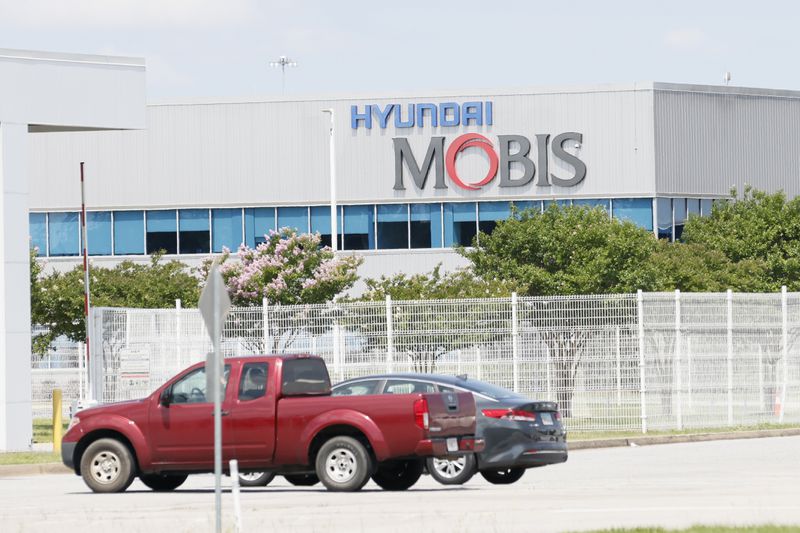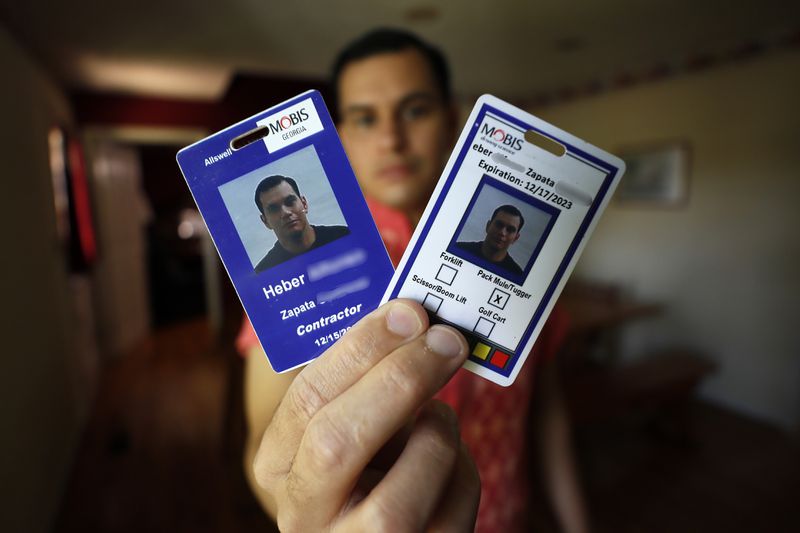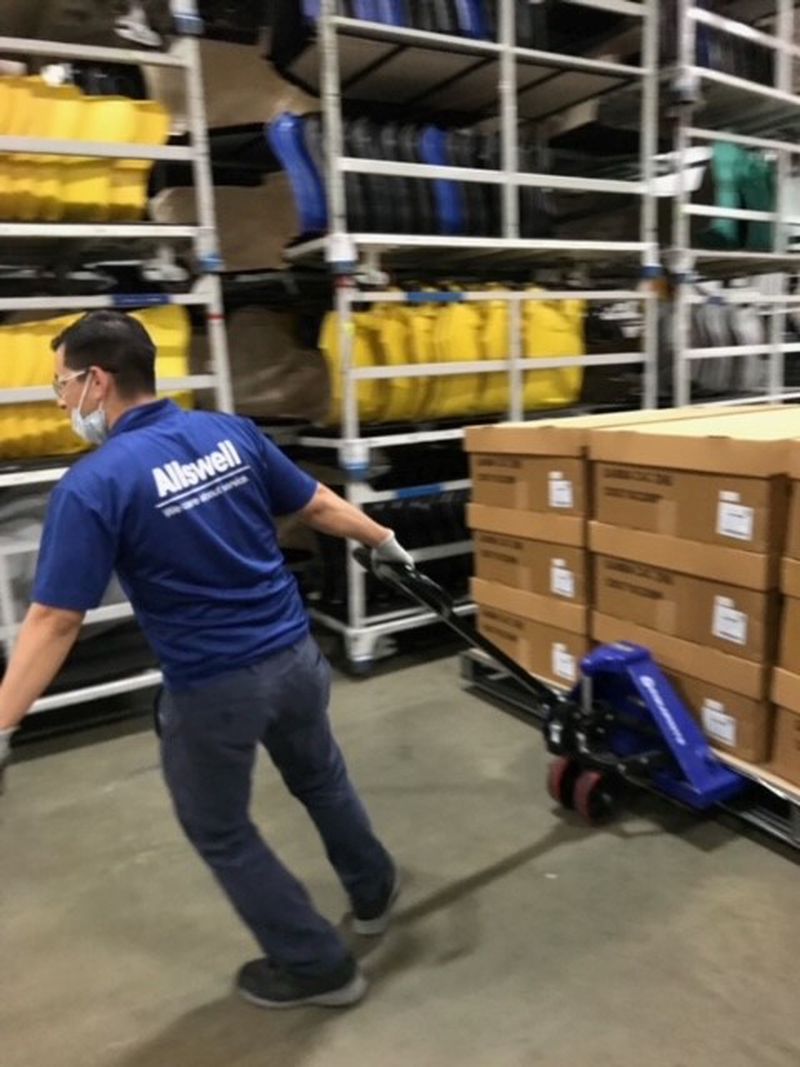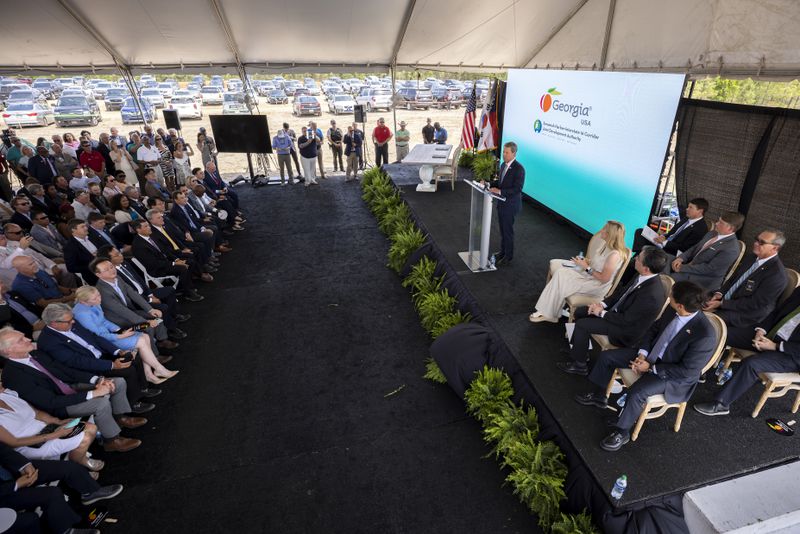Georgia-based companies recruited Mexican college graduates for engineering work – but they allegedly had them perform assembly line work instead.
Among the belongings Luis packed for his trip from Mexico to Atlanta was a business suit.
A mechanical engineer by training, Luis had spent the bulk of his career since his 2012 college graduation working in the auto industry in his native Aguascalientes. He had just accepted a quality engineering role based in West Point, Georgia, and was hopeful the international work experience could unlock even better opportunities down the line.
But things began falling apart almost as soon as he landed at Hartsfield-Jackson International Airport, on a cold night in December 2020. A man sent by Luis’ new employer greeted him with a strange revelation: the engineering job he had been hired to do – and which he uprooted his life in Mexico to take – did not exist.
For the next 11 months, Luis would put in 12-hour shifts on the factory floor of a Georgia auto parts manufacturer, where he carried heavy loads to keep the assembly line fed. The nature of the work — which involved lugging parts such as bumpers or transmissions weighing over 100 pounds — put strain on his back, his hands, his feet.
Luis is one of six Mexican nationals who told The Atlanta Journal-Constitution they were brought to the U.S. under false pretenses, with engineering job offers from a staffing agency proving to be smoke screens for low paid assembly-line work. The men provided documents showing a little-known visa program that immigrant watchdogs say is ripe for abuse paved the way for the agency to bring them to Georgia.
“For me, it was just surreal,” Luis said. “I kept asking myself, ‘Am I dreaming?’ Like, what is happening? What is going on?”
The visa that allowed Luis and others into the country is the Trade NAFTA —or TN — visa, meant to fill high-skilled jobs in the U.S. with Mexican and Canadian professionals. According to a list published by the U.S. Department of State, jobs as engineers and technicians are among the professions covered by the TN visa program. Assembly line work is not.
With little oversight of the TN visa program, some immigrant advocates report a growing pattern of fraud resulting in worker exploitation, with many cases linked to the auto sector in the Southeast.
The company that hired the Mexican nationals and that supported their applications for TN visas is a Newnan staffing agency, GB2G, Inc. also known as Allswell. Workers say Allswell hired them to work for several different auto parts manufacturers in the West Point area that supply the Kia auto plant there.
Allswell hasn’t been charged with any wrongdoing in connection to its use of the TN visa program.
In response to questions from the AJC, Allswell issued a statement that the company “provides engineering staffing solutions” and is “in full compliance with all federal, state, and local laws and regulations.” The company said, “Federal agents have performed on-site inspections at [Allswell] related facilities to verify compliance and have determined no violations have been made.”
Only one of the Mexican professionals interviewed by the AJC has filed a formal complaint against the company. Despite their accounts of being misled by the company and its affiliates, the other workers said they preferred to move on rather than initiate a potentially lengthy legal process. With one exception, the AJC is not using workers’ full names because their legal status may be in limbo after leaving the staffing agency but choosing to remain in the United States, putting them at risk of deportation.
During Luis’ first night in the state, he says the housing he’d been promised by Allswell turned out to be a spot on the floor in a house shared with seven other TN workers.
“I laid there and obviously I couldn’t sleep, out of frustration,” he said. “I was thinking, ‘The only thing left would be for them to take us to the cotton fields tomorrow.’”
He had packed a suit for nothing.
A rising trend
The six Mexican nationals interviewed by the AJC arrived between December 2020 and May 2021. During that stretch, a worsening pandemic left jobs unfilled and set the stage for a surging labor movement — conditions that made low-wage jobs harder and harder to fill with U.S. workers.
“It’s a huge moment” in the economy, said Shelly Anand, executive director of the Sur Legal Collaborative, an immigrant and workers’ rights non-profit based in Atlanta. “And so employers are going to look elsewhere for a labor force that is going to be more compliant … especially in some of these industries where there’s high turnover.”
Staff at the Centro de los Derechos del Migrante (CDM), a migrant workers organization that operates in Mexico and the U.S., say allegations of TN visa fraud of the kind coming out of the West Point auto sector are not unusual.
“It’s definitely notable to us that it’s going on in an industry that has such a high level of visibility in that region and has sort of been held up as this model for rural economic development,” said Ben Botts, CDM’s legal director. “When you think about the shiny cars rolling off the assembly line … it’s not something that’s on people’s radar, that the industry is sourcing its parts from producers who appear to be engaging in practices that are highly concerning and in many cases unlawful.”

Credit: Miguel Martinez
In April, a class action lawsuit filed in Atlanta federal court claimed a Gwinnett-based labor recruiter used the TN visa program to hire dozens of Mexican engineers, who said they wound up performing manual labor in a facility based in Luverne, Alabama. The lead plaintiff in the case is Jaime Obregon Acosta, a Mexican national who holds a bachelor’s degree in mechanical engineering and a master’s in business administration. While on the job, Obregon and others allegedly “had to work horrendously long hours on the production line at hourly wages that were a fraction” of that of U.S. citizens. Over 40 hired through the visa program have joined the suit.
Daniel Werner, a civil rights litigator who is representing Obregon and his colleagues, said he is coming across cases of visa misclassification “over and over again,” where companies’ aim is to lower labor costs.
For the Allswell employees interviewed by the AJC, the prospect of an engineering job north of the border felt validating, a sign that years of study and resume-building in Mexico had earned them a legal shot at the American dream. When they realized their new jobs were not what they expected, the men said they hung on for several months, clocking in at the Georgia factories because they needed to make money somehow and finding a new job in Mexico during the pandemic could prove difficult.
Some of the workers said they were too ashamed to go back to Mexico and face their families as victims of what they perceived to be demeaning treatment.
“They treated us like we were animals,” Luis said. “Like pack mules.”
“It was a total lie,” Augusto, another engineer, said of the job offer that got him his visa. “They’re making the U.S. government believe that they are bringing in qualified personnel for a professional job, but it’s a lie.”
Charles Kuck, an immigration attorney and past president of the American Immigration Lawyers Association, said that if the Mexican engineers’ descriptions are true, their experience in Georgia could amount to human trafficking. In fact one of the engineers has applied for protection under human trafficking laws.
“It’s just flat out illegal. It’s fraud,” he said. “You can’t bring in production workers under a TN visa…. This is crazy.”
Because the auto parts manufacturers didn’t directly employ the Mexican nationals, relying instead on a third-party staffing firm, they might not be responsible if a violation of the TN visa program were found.
“They treated us like we were animals. Like pack mules.”
“It really is the job of the staffing agency to verify immigration status,” said Charlotte Alexander, associate professor at Georgia State University’s College of Law with a focus on employment litigation. “One reason that employers in all industries use these third-party staffing agencies is in part to shield themselves from liability and compliance costs.”
The Mexican engineers who spoke to the AJC provided documentation to show they worked at three parts makers that supply automaker Kia in West Point. On its website, staffing agency Allswell lists the three— Hyundai Mobis, Hyundai Glovis and Mando — as part of its client roster. All are South Korean auto parts manufacturers with facilities in the West Point area.
Mobis and Mando didn’t respond to repeated requests for comment. The head of Glovis Georgia’s HR department told the AJC that her company doesn’t work with Allswell. She suggested another Hyundai Glovis subsidiary with a presence in West Point, Glovis America, could have received the Allswell workers. Glovis America did not respond to requests for comment.
Kia Georgia said in a statement that it is “committed to providing equal employment opportunities to all applicants regardless of their ethnicity, citizenship or other protected status, subject to applicable employment and immigration laws … We encourage and expect the same principles from our business partners.”
The Newnan staffing agency Allswell should not be confused with All’s Well, a healthcare staffing firm with branches in California, South Carolina, Nevada, Florida and Pennsylvania.
Limited oversight of a growing visa program
TN visa status is only meant for Canadian or Mexican nationals who intend to work in the U.S. temporarily.
To qualify, applicants must have received a U.S. job offer that falls under a list of 60 NAFTA professions, nearly all of which require at least a bachelor’s degree and include jobs in the fields of law, education and accounting.
“There’s no flexibility built in. You’re on the list of [NAFTA professions] or you’re off the list,” said Nisha Karnani, an Atlanta immigration attorney. Deviating from those professions after entering the country would “definitely [be] immigration fraud.”
Because of the limited eligibility requirements, the TN visa program accounts for only a small number of foreign workers especially relative to other, more popular types of employment visas.
Despite its small size, the TN program is growing. In fiscal year 2021, the U.S. issued 24,904 TN visas, up from 16,119 just four years prior – a more than 50% increase, according to federal data. Of the total number of visas issued to TN workers and their dependents in 2021, the latest year for which data is available, Mexico accounted for an overwhelming 98.8%.
The application process, Kuck noted, is straightforward and fast. “It’s the easiest visa to get, if you qualify.”
Yet once here, TN visa workers and their employers go largely unscrutinized.
That stands in sharp contrast to other types of guest worker programs, including one with a wider name recognition and footprint in Georgia: the booming H-2A program for migrant farmworkers, which brought in 35,000 workers in 2021.
Labor violations involving agriculture’s migrant workforce are far from rare, and they can be gut-wrenching in nature. But there’s a mechanism in place within the H-2A program to prevent abuse, conduct investigations, and hold bad actors accountable. The U.S. Labor Department’s Wage and Hour division enforces work contracts, ordering employers to pay back wages and referring cases for prosecution as the need arises.
Equivalent labor protections don’t exist for TN workers.
“TN is kind of the Wild West. I mean, the workers come here and there’s just no reporting, no oversight…. And I think that’s part of the reason why it’s attractive to some employers,” Werner, the civil rights attorney, said.
Because a TN visa is tied to the workers’ employer who helps them obtain the visa, quitting to take a better job in the U.S. can be difficult, leaving workers stuck.
The State Department operates the TN program for Mexican applicants. In a statement, a department official noted that the agency “works aggressively to ensure the integrity of U.S. visa adjudications,” with every visa application receiving “extensive vetting” before being approved.
It’s unknown how many TN visas have been issued to Georgia workers. The State Department told the AJC that it does not collect or publish data on TN visas broken down by destination state or employer.
Chance of a lifetime
In the fall of 2020, Heber Zapata was working as a process engineer at a Mexican corn flour manufacturer when he came across a LinkedIn job posting that caught his eye. A Georgia labor recruitment agency called SPJ Connect was looking to fill U.S.-based engineering roles, according to him.
But the promising job Zapata moved nearly 2,000 miles to take was nothing like it had been described, he said. Nearly two years later, the 28-year-old is still in LaGrange, hoping the U.S. government will declare him a victim of human trafficking.
Zapata’s experience during the job recruitment process was echoed by other workers, all of whom secured their visas to work in Georgia through SPJ Connect.
According to Zapata, Spanish-speaking SPJ Connect staff set him up on a job interview with the Newnan staffing agency Allswell. In an email to another Mexican job seeker, an SPJ Connect employee wrote that Allswell was a “company that provides [labor] outsourcing services to other businesses that are located in Georgia and that are looking for production engineers, maintenance engineers and internal logistics engineers.”

Credit: Miguel Martinez
In short order, Zapata was offered a $44,000 salary as a “production engineer,” and a package of benefits that exceeded his earnings in Mexico. To support his application for a TN visa, Allswell sent Zapata a letter stating he had been offered a job that was “professional and specialized in nature.”
With his education and multiple years of experience, the letter stated Zapata had “the required knowledge and sophistication that would enable him to comprehend complex engineering concepts and scientific theoretical principles.”
Zapata’s $44,000 salary offer was a detail that should have been a red flag to State Department officials, according to Kuck. In the West Point area, the average annual salary for mechanical or industrial engineers is roughly $80,000, as reported by the U.S. Bureau of Labor Statistics.
The AJC reviewed six TN visa support letters provided by the Mexican nationals who were recruited by SPJ Connect and hired by Allswell to work at auto parts manufacturers in West Point. The letters show five of the men were hired to work at the Hyundai Mobis plant and one at the Mando plant. Salaries they were offered ranged from $40,000 to $44,000 a year.
Once in Georgia, Zapata says the nature of the work he was asked to do didn’t match what was described on his visa.
Zapata’s job turned out to be working the overnight shift — 7 p.m. to 7 a.m. — on the assembly line at the Hyundai Mobis plant, a Kia supplier located in West Point.
Pay also fell short of the $44,000 he had been promised: His paychecks show Zapata earned roughly $580 a week, which amounts to just over $30,000 a year. According to Zapata, American workers at the same plant performing similar work earned an hourly wage higher than his $11 per hour.
Zapata took his complaints to several law enforcement agencies, but they apparently did nothing to follow-up.

Credit: Miguel Martinez
According to a LaGrange Police Department incident report filed July 24, 2021, Zapata told an officer he worked as a production line worker at Hyundai Mobis despite being offered a job as an engineer – and having been allowed entry into the country only on the basis of that engineering job offer. His information was taken, but no action was noted in the paperwork. He also made a report to the National Human Trafficking Hotline, which issued him a case number, and he filled out a form to report suspected criminal activity on the website of U.S. Immigration and Customs Enforcement (ICE).
Eight months after he arrived in West Point, Zapata left Allswell in August 2021. He later turned to an Atlanta immigration law firm to apply for a visa that grants legal status to victims of human trafficking, a crime involving the use of force, fraud or coercion to obtain some type of labor.
He said his allegations of trafficking are still under investigation.

Credit: Courtesy of Heber Zapata
An emotional pitch
In the meantime, labor recruiter SPJ Connect continues to advertise new job vacancies, with videos on social media showing staff pitching their services and the benefits of the TN visa to students in universities across Mexico.
Zapata says inexperienced young graduates are less likely to complain about working conditions once in the U.S. because the wages here – even for assembly line work – far exceed salaries in Mexico for new graduates.
On SPJ Connect’s Facebook page, a recording from an April 8 visit to the Universidad Tecnológica de Huejotzingo captured the aspirational rhetoric at the heart of the company’s recruitment strategy.
“It’s just flat out illegal. It’s fraud. You can’t bring in production workers under a TN visa. … This is crazy.”
Addressing a crowd gathered at a campus auditorium, an SPJ Connect executive, Yadira Leos, explained that although students might only have heard of U.S. work programs in the context of agricultural labor, the TN visa is different.
“You will be able to go to the U.S. and grow personally and professionally … [Your loved ones] will see you grow and you will impact their lives…. Because if you can do it, they will say, ‘I can do it, too,’” she said, noting that her company has roughly 500 vacancies to fill every single month.
One of Leos’ colleagues, Elizabeth Cantú, is seen on the video explaining in Spanish that all the jobs SPJ Connect recruits for are in the U.S. automotive industry. Her brief presentation suggested assembly line work would be their first job in the U.S.
“Everyone goes to the production line the first year” regardless of job title, Cantú said in the video, which has since been deleted.
Who’s who
Allswell is a staffing agency registered in Coweta County that provides workers to Georgia-based automotive industry manufacturers. It was the employer of the Mexican nationals interviewed by the AJC. Allswell should not be confused with All’s Well, a healthcare staffing firm with branches in California, South Carolina, Nevada, Florida and Pennsylvania.
SPJ Connect is a labor recruiter based in Hogansville with offices in Mexico. It was the first point of contact for the workers interviewed by the AJC, and helped them apply for their TN visas.
Hyundai Mobis in West Point, Georgia is the auto parts manufacturer where five of the six Mexican nationals interviewed by the AJC worked. The plant builds chassis, bumpers and cockpit modules for nearby Kia, the only automobile company with a manufacturing facility in Georgia. A Select Georgia report from 2018 identified the Mobis plant as one of the top auto employers in the state, with nearly 850 workers
But working on an assembly line for any length of time while on a TN visa constitutes immigration fraud, according to Kuck and Karnani.
SPJ Connect and Allswell present themselves as two different entities — Allswell is listed as a “satisfied client” on SPJ Connect’s website, alongside Hyundai Mobis, Mando and other manufacturers. Yet, according to information from the Georgia Secretary of State’s Corporations Division, SPJ Connect and Allswell share the same registered agent address: 124 Big Horn Drive in Newnan. And an individual named Youngjin Lee is listed as both CEO of SPJ Connect and secretary of Allswell.
SPJ Connect did not respond to repeated requests for comment.
‘They don’t stop asking for Mexicans’
Georgia’s growing auto industry has been a boom to the state’s economy, generating enough jobs to transform more rural stretches of the state.
But jobs taken by migrant workers could mean Georgians aren’t reaping the full economic benefits of jobs located here. And if some visa workers are paid less than local workers, it could incentivize employers to rely more and more on foreign labor pools.
“Employers are going to naturally prefer the cheaper, more vulnerable option,” Botts said.

Credit: Stephen B. Morton for The Atlanta Journal Constitution
For those trying to recruit workers in Mexico, employers’ preference for TN employees over locals is a selling point, even if the influence of possible pay disparities goes unacknowledged.
“Before filling vacancies with local workers, [companies] give us the opportunity to bring them people from here,” said Leos during SPJ Connect’s visit to the Universidad Tecnológica de Huejotzingo. “Believe me. Once they become familiar with the Mexican work culture, they don’t stop asking for Mexicans.” She repeated that message in a June 13 Facebook Live.
SPJ Connect and Allswell’s efforts to recruit Mexican workers for Georgia manufacturing jobs has received a boost from LaGrange city officials.
In July 2021, a Mexican news site reported that two officers from the city of LaGrange’s Economic Development Office participated in a SPJ Connect recruiting trip to a local university. Three months earlier, a consortium of Mexican technical colleges announced they had signed a “collaboration agreement” with SPJ Connect to “allow for the placement of our graduates in American companies.” The LaGrange Economic Development Office reportedly hosted the signing ceremony.
LaGrange Mayor James Thornton did not respond to questions from the AJC about the city employees’ involvement with SPJ Connect.
“We always hope that local industries are able to hire local residents when possible,” he said in a emailed statement. “One of the primary goals of economic development is the creation of jobs for our residents. Of course, we understand that not all jobs can be filled locally, and industries have to recruit workers from other areas, including internationally.”
Demand for foreign workers can generate tension on the assembly line, as the Mexican nationals interviewed by the AJC explained.
“The comments we got were like ‘Get out of here;’ ‘You’re taking jobs from my people,’” Augusto said. “Every plant that has Mexican workers, the people that work there know that they earn much more than us. Of course they know.”
‘I wanted to be a respected person’
As a child growing up in the Mexican state of Sinaloa, Jose headed to the fields when his school day was done. There, he helped his parents harvest garlic, eggplant, and chili peppers, among other crops.
Becoming the first in his family to graduate from college took many sacrifices, but his industrial engineering degree turned out to be the middle class ticket he had hoped for. In 2019, the now 29-year-old rose to production supervisor at a biotechnology company in Tijuana, where he earned roughly $850 per week. Hoping to pick up new skills and improve his English, he accepted a production engineer position in 2020 at Hyundai Mobis and moved to Georgia on a TN visa.
The line assembly work he found instead marked a return to a life of manual labor he thought he’d left behind.
The AJC is withholding Jose’s last name due to the uncertainty of his current immigration status now that he has left Hyundai Mobis but has remained in the U.S.
“It destroyed me like you have no idea … physically, emotionally, psychologically,” he said. “How is it possible that I killed myself studying and working to try to have a better life when, at the end of the day, it would have been the same if I had just come here illegally?”
Shame kept Jose from letting family members know about his life in Georgia, he said.
“I wanted to do things the right way. I wanted to be an engineer. I wanted to be a respected person.”
“I’m biting my lip now as I talk to you to make sure I don’t start crying.”
How the AJC got the story: In April 2022, the AJC published a story about a class action suit filed in Atlanta federal court, which claims that a Gwinnett-based labor recruiter exploited the TN visa program to bring in dozens of Mexican engineers into the U.S., where they allegedly labored as production line workers. As that story spread on social media, six former Allswell employees reached out to the newspaper to say they had similar experiences. Over the course of hours-long interviews in Spanish, the men provided details of their recruitment and work in the U.S., including documents that verified their job offers and shed light on their journeys from their homes in Mexico to Georgia factory floors.
